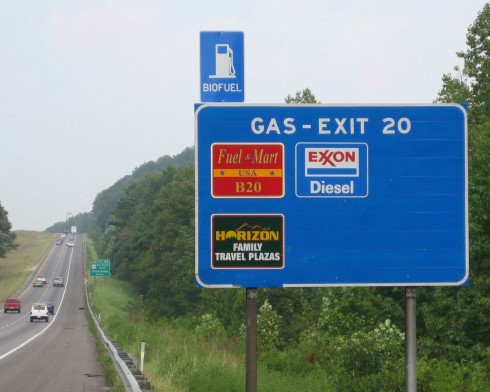The Tennessee Department of Transportation (TDOT) is promoting the use of renewable fuels across the state, increasing the number of fueling stations that offer renewables through its “Green Islands” program.
Background
While E10 (a mixture of 10 percent ethanol and 90 percent gasoline) is now widely available, an increasing portion of the U.S. automobile fleet has been manufactured to be “flexfuel,” and able to use E85 (a mixture of 85 percent ethanol and 15 percent gasoline). Additionally, most diesel engines are able to use B20 (a blend of 20 percent biodiesel and 80 percent petrodiesel). However, a major impediment to increasing adoption of renewable fuels such as E85 and B20 is the lack of infrastructure to distribute the fuel.
TDOT faced this issue by helping establish a “green islands biofuel corridor network” of fueling stations not more than 100 miles apart along the highways that connect the state’s major cities and destinations. The goal of “green islands” is to enable travel across the state using biofuel exclusively. These alternative fuel stations provide public access to biofuels along major corridors for consumers wishing to use them and reduce their consumption of fossil fuel. While some gaps in the network remain, TDOT will continue to offer grants to fuel stations as incentives to fill the gaps.

Tennessee DOT’s Green Island program increases public access to biofuels. Source: Tennessee DOT
“Increasing the availability and use of biofuels in Tennessee will help increase energy security, reduce air pollution and benefit the state’s economy, according to Alan Jones, Manager of the Policy Office in TDOT’s Long Range Planning Division. “The Green Islands grant program encourages fuel stations to offer these fuels to the driving public,” he said.
‘Farm to Fuel Tank’ Vision
The benefits of reducing fossil fuel consumption and displacing imported petroleum with alternative fuels have been discussed for many years. However, the “green island” concept accelerated in the early 2000’s when the Tennessee Farm Bureau started investigating how the state’s agricultural community could assist in biofuel production. A vision of a vertically integrated biofuels industry wholly within Tennessee (“From Farm to Fuel Tank in Tennessee”) began to take hold.
The Tennessee legislature was called upon to pass legislation to implement the vision. Proponents discussed obtaining seed money, such as grants, to advance the concept. The legislature determined that encouraging in-state biofuel production was in the state’s economic interest, and therefore worth providing incentives. One law passed by the legislature named the TDOT to be the agency to manage a grant program for fuel stations to encourage increased availability of biofuels to motorists and vehicle fleet owners in the state. The grant program offered funding to purchase and install biofuel storage and fuel dispensing equipment across the state. TDOT stepped up, administering a program to provide public access to the fuel.
TDOT has since published several Requests for Proposals (RFP) aimed at gas stations willing to make biofuels publicly available for four years, in return for grant funding to help purchase and install the infrastructure. A subsidy was set at a maximum of $45,000 per biofuel pump. The maximum grant was capped at $90,000 for a single location, if the station proposed to sell both biofuels, E85 and B20, to the general public.
While most applicants proposed one or two pumps, several owners proposed multiple stations to achieve economies of scale. One owner proposed three locations, and received a total benefit of $270,000. Presently there are 60 E85 pumps statewide. Around half were installed by private sector operators deciding on their own to offer biofuels to their customers.
When stations meet their four-year contract obligation, many continue to sell the fuels, but some do not. Stations that have been the most successful helped market the fuel on their own. The vision of “From Farm to Fuel Tank in Tennessee” remains, although increasing the use of biofuels has lagged for numerous reasons. State grant funds remain available for stations still interested in selling alternative fuels.
Funding for the program has come from several sources. The state’s first E85 pump, which came on-line in 2003, was funded by the U.S. Department of Energy. In air quality nonattainment areas, TDOT used funds from the Federal Highway Administration’s Congestion Mitigation and Air Quality Improvement Program. TDOT also received significant state funding from the state’s General Assembly for the green islands program.
An important part of the program includes increasing public awareness about biofuel, its benefits, and where drivers can purchase these cleaner fuels. As part of the interstate blue logo sign program, TDOT developed and posted blue signs with a biofuel image to advertise the locations of green island stations.
Grants provide an incentive for fuel stations to install the fueling infrastructure but, in the long run, stations will not continue to sell biofuels unless their customers buy them. Sustaining market demand for biofuels will require a more vigorous advertising and public education campaign at the state and national level.
For more information on the program, contact Alan Jones, Policy Manager, Long Range Planning Division, TDOT, at [email protected].